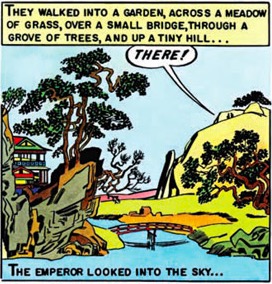My most shameful exhibition of greed and entitlement happened when I was age eleven, and it involved a G.I. Joe toy.
In 1985 I was in the odd position of living in a fairly low-income house with my single mom during school days, while being widely spoiled by grandparents on weekends. So, I frequently wore thrift store clothes and ate food from those blue generic cans during the week, and yet watched Saturday morning cartoons and was able to convince people to buy those toys for me on special occasions.
In December 1985, I had a modest G.I. Joe action figure collection and coveted the large pieces to complement them, like the U.S.S. Flagg ircraft carrier. Christmas day arrived and I tore through the bounty that my mom’s parents had provided in their immaculately organized mid-century home. Perfectly wrapped presents were ravaged in seconds, and on to the next, until the pile of paper sat next to the uncovered boxes.
I surveyed the now-unwrapped gifts in front of me. The kind of emotional displeasure that can happen to a privileged pre-teen descended upon me as my sister opened her Barbie Dream Car. I realized the box which it came in would hold all of my toys together in their boxes. I started crying, blubbering something about “it’s not fair.”
Thirty years later, I am mortified that I was such an ungrateful kid. However, I am also grateful that through all the other all-too-typical bullshit I experienced due to an absent dad and depressive mom — the insecurity; the retreat to the fictional world; the reliance on the kindness (and cruelty) of the kids in the neighborhood; the need to control my surroundings; basically, all the things that happen that we don’t deserve — that I was given the opportunity to wear this minor setback as a personal tragedy.
Then, as I was sniffling, I was told to go into the bedroom and look in the closet. There, below the upper-middle-class wardrobe, was a giant box containing the G.I. Joe Transportable Tactical Battle Platform, a gaudy piece of cheap plastic designed to emotionally satisfy spoiled brats like me on Christmas Day. My present was so fucking big my grandma probably couldn’t use a standard roll of paper on it, and went the secret finale route. I smiled through drying tears, and for those weeks or months, when I was tossing 3-inch-tall plastic army men around a oil-platform-looking-contraption, all was right with the world.
The evening of July 2nd, 2015, I woke up from an afternoon nap and contemplated my evening plans. My kids were with their own grandparents (being appropriately spoiled themselves). I had put in an extra few hours for work that day, and I didn’t need to get up until 9:00 the next morning to pick the kids up.
After sending one half-hearted, exploratory text to friend, I decided to drag my ass, solo, the forty minutes down Hwy 45 to see mewithoutYou play at a local club, Fitzgerald’s. I had first found out about the band a year earlier, and had seen them play once as opening act. I am a rabid fan of one album, It’s All Crazy, It’s All False, It’s All a Dream, It’s All Right!, and am familiar with a couple other albums, but just barely.
I timed it perfectly, and greeted the bouncers as the band greeted the crowd. The show wasn’t packed, and I had a nice spot in the back to watch. They played only a single track from my favorite record, but they sounded great. The energy was good and the crowd was pleasant and passionate.
After 45 minutes, they walked off stage and said thanks.
I double checked the time and thought, Well, shit. I hope the encore is long. That’s a pretty short set for a headliner. I would have thought with a half-dozen albums worth of material, they could have played for another 45. I know they don’t owe me anything, but man, that was a short set, I guess their heart’s not in it.
Basically, I was petulant eleven-year-old all over again. They didn’t owe me shit, but my entitlement was riding high.
They came back out and played two more songs, finishing strong with super high energy. Then the singer, Aaron Weiss, said something interesting. He said that he would be out in the parking lot with an acoustic guitar after they broke down and he loaded out. In my mind, I was already planning on finding somewhere that had wifi and fried chicken for a post-show dinner or to maybe catch a movie (it was only 10:15 after all). I didn’t leave, though, and I dried my figurative tears.

